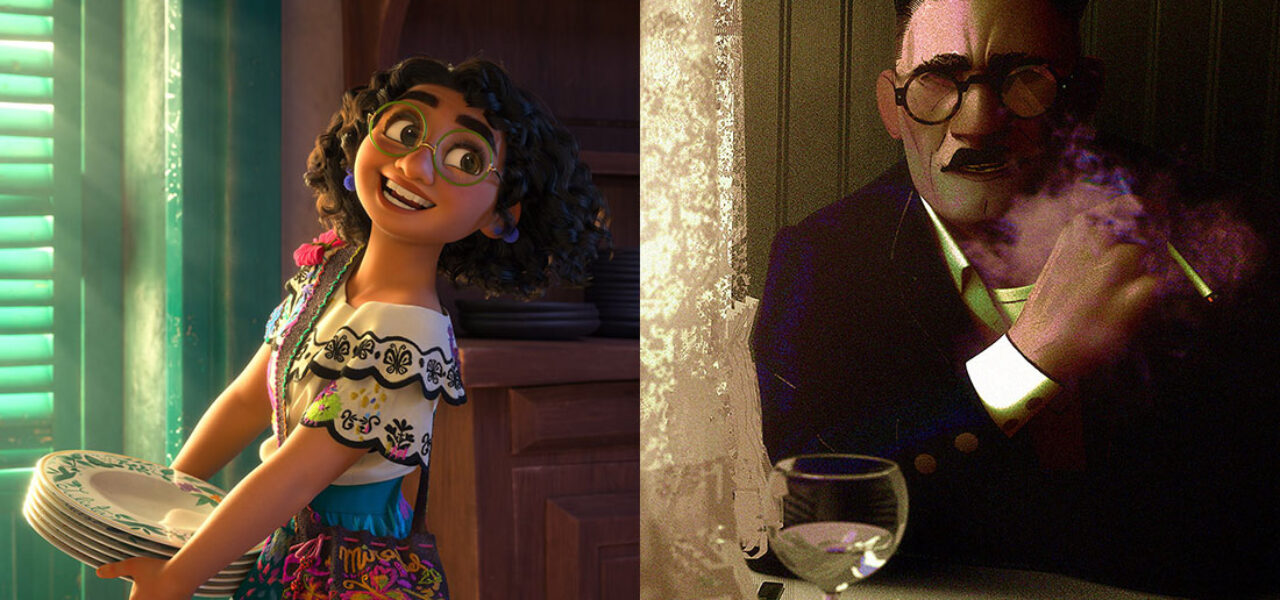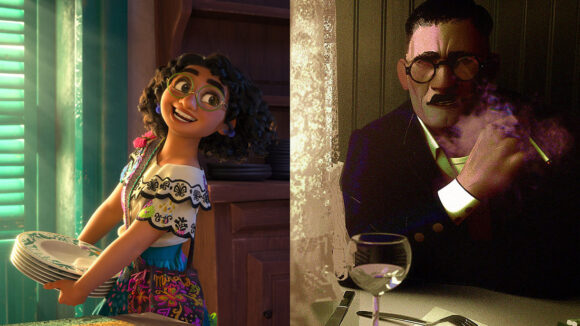

During The Biggest Oscar Trainwreck In History, ‘Encanto’ And ‘The Windshield Wiper’ Won Oscars (Commentary)
On a disaster of an evening where Worldstar-style attacks figured into the live ceremony and the entire #MeToo movement was undermined and trivialized by abhorrent bad taste, the Academy of Motion Picture Arts & Sciences also made it abundantly clear that it has zero respect for animation as an art form.
It was somehow fitting that in an evening absent of all decorum, the Academy found two different ways to trash the animation art form during its 94th Academy Awards, and pulled off the remarkable task of disparaging the nominees in both the animated short and animated feature categories.
The problems started when the Academy brought out three actresses who have portrayed Disney princesses to present the Oscar for animated feature. The actresses – Lily James, Halle Bailey, and Naomi Scott – used the moment to promote Disney’s upcoming live-action remake of The Little Mermaid, a remarkable piece of bad taste for an award that is meant to celebrate animated filmmaking, not promote Disney products. But as we learned earlier this month, the Oscars, which air on Disney-owned ABC, have to acquiesce to certain demands from Disney, and it would not be surprising to learn that Disney had influence in how this category was presented.
If the entire set-up didn’t stink, the three actresses made it worse by claiming that animation is an exclusively children’s art form. James and Bailey explained that “so many kids watch these movies over and over and over and over and over and over and over,” before Scott chimed in, “I see some parents out there know exactly what we’re talking about.” This happened on an evening where the stunningly adult work Flee was among the nominees. (Flee, which was also nominated for international feature and documentary feature, went home empty-handed.)
The crass dismissal of animation as a children’s art stunned even the nominees in the category. Phil Lord, who was the producer of the nominated The Mitchells vs. The Machines, tweeted the following:
Super cool to position animation as something that kids watch and adults have to endure
— Phil Lord y Betancourt (@philiplord) March 28, 2022
Other reactions from online users tell you all you need to know about how the Disney princess presentation was received:
Animated films are for kids? I guess someone didn’t see “all” the animated Oscar nominations this year, wonder how often that’s been the case for voters.. 0.o #Oscars #animation #film
— Paul Williams (@artporu) March 28, 2022
the oscars painting the picture of animation being for children is no surprise because they literally don’t give a shit about animation nor do they take it as a serious medium
— aisha (@arbacn) March 28, 2022
This belittling of animation starts with the disparity in wages. What they did at the Oscars it’s just a little example of how they profit off the medium without recognizing it’s worth
— Alex Hernandez (@alhernandezart) March 28, 2022
the animation category really said "let's get a bunch of disney princesses to say animated films are for kids, joke about how everyone has had to endure rewatching one of Disney nominees over and over, and then pretend an adult-oriented film like FLEE even had a tiny chance"
— Houston Coley (@blockbustedpod) March 28, 2022
Having three live action Disney princesses to give Best Animated Feature to yet another Disney movie on a Disney owned channel is the equivalent to the Kids Choice Awards having SpongeBob win Best Cartoon on a yearly basis because it’s airs on Nickelodeon. I hate it here.
— Rendy Jones (@Rendy_Jones) March 28, 2022
The category ended as we’ve come to expect: Encanto, one of the Disney company’s three nominees in the category, won the Oscar. The film, directed by Jared Bush and Byron Howard and produced by Clark Spencer and Yvett Merino, was Disney’s ninth win in ten years, and 13th win in 15 years.
If the animated feature presentation wasn’t sketchy enough, there was more evidence of Disney Company tampering at the Oscars: Disney used part of the Oscar telecast for Chris Evans, star of Pixar’s upcoming Lightyear, to introduce a commercial for the film. Viewers in the United States would have not noticed anything out of place, but as we noted in the tweet below, in international markets where the Oscars didn’t air on Disney’s ABC, no one saw the commercial.
This brazenly unethical use of Oscar airtime to promote a Disney animated feature is a stunning conflict of interest for The Academy, especially in a year when they claimed they had to cut eight categories due to the ceremony being too long.
To be clear, the issue is that the Chris Evans intro was part of the official telecast, even though he was introducing a Disney advertisement. Shady AF
— cartoonbrew.com – Animation News (@cartoonbrew) March 28, 2022
Speaking of cutting categories, the animated short category was one of eight categories that was presented ahead of a time and cut from the live telecast, instead being presented as a pre-recorded segment.
Academy president David Rubin expalined that these categories were being cut “in order to provide more time and opportunity for audience entertainment and engagement through comedy, musical numbers, film clip packages and movie tributes.” What he didn’t mention is that in place of honoring the nominated films, they would air two musical numbers from Disney’s Encanto, including one for “We Don’t Talk About Bruno,” a song that wasn’t even submitted for Oscar consideration.
The downgrading of these categories drew condemnation from countless filmmakers, including Steven Spielberg, Jane Campion, and Denis Villeneuve, and infuriated countless Hollywood craft organizations.
Sadly, this meant the winner in the animated short category didn’t get the moment of glory they so richly deserved. The winner was the U.S./Spain production The Windshield Wiper directed by Alberto Mielgo and produced by Leo Sanchez.
Even as animation was repeatedly denigrated throughout the evening, Mielgo’s classy acceptance speech serves as a reminder for the animation community to not give up, even in the face of mass indifference from Hollywood. We must continue fighting for the recognition of animation as an art form that has the capacity to express all ideas and emotions. Said Mielgo:
“Animation is an art that includes every single art that you can imagine. Animation for adults is a fact. It’s happening. Let’s call it cinema. I’m very honored because this is just the beginning of what we can do with animation.”

.png)